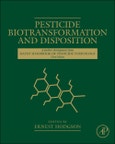Biotransformation of Pesticides is an updated, "one-stop" resource for academic, industry and regulatory scientists involved in research and regulatory activities related to pesticide biotransformation and human health. This book provides an in depth look at how pesticides are biotransformed, which is essential to understanding exposure, dose, toxicity and health risks. This essential reference contains the biotransformation of pesticides from uptake to excretion, including toxicokinetics and emphasizes metabolism in non-target species, including experimental animals and humans.
Please Note: This is an On Demand product, delivery may take up to 11 working days after payment has been received.
Table of Contents
1. Pesticide Disposition2. Summary of Methods used in the Study of Pesticide Biotransformation and Disposition
3. Absorption
4. Introduction to Biotransformation
5. Metabolism of Pesticides
6. Distribution and Pharmacokinetics
7. Metabolic Interactions of Pesticides
8. Pesticide Excretion
9. Examples
10. Summary
Authors
Ernest Hodgson Ernest Hodgson, PhD, Distinguished Professor Emeritus, Department of Environmental and Molecular Toxicology, North Carolina State University, Raleigh, NC, USA.Dr Ernest Hodgson, Distinguished Professor Emeritus, North Carolina State University and Executive Director, Foundation for Toxicology and Agromedicine was educated at King's College of the University of Durham (now the University of Newcastle), Oregon State University and the University of Wisconsin. At North Carolina State University since 1961 he was a William Neal Reynolds Professor and Head of the newly formed Department of Toxicology. He was also one of the founders of the three university (East Carolina University, North Carolina State University and North Carolina A&T University) program in agromedicine, an organization which led to the formation of the North Carolina Agromedicine Institute.
Dr. Hodgson has conducted research on xenobiotic biochemistry for several decades, has authored c. 400 peer-reviewed papers in this area, and is editor and part author of several monographs. Most recently his research has focused on human studies utilizing human hepatocytes and sub-cellular preparations. Currently involved as a collaborator with Dr Michael Roe in RNAseq studies of genome-wide effects of environmental chemicals. From 1961 until his retirement he was supported by extramural funding, primarily from NIH (NIEHS) and the US Army.
Dr Hodgson is also editor and contributing author of toxicology textbooks (Textbook of Modern Toxicology and Molecular and Biochemical Toxicology, both currently in their 4th editions) and is a lexicographer (Dictionary of Toxicology, under revision for a 3rd edition and a Dictionary of Agromedicine, being created for the NC Agromedicine Institute). He is well recognized for his role as a teacher of toxicology. In addition to his role as editor and part author of textbooks he has trained some 40 graduate students and 20 post-doctoral research associates.
His service on federal study sections and other federal panels has been extensive and includes the following agencies. NIH, NASA, US Army and others. He has been recognized by awards from the Society of Toxicology, the American Chemical Society, the International Society for the Study of Xenobiotics, the Consolidated University of North Carolina and North Carolina State University. He is a past president of the International Society for the Study of Xenobiotics.








